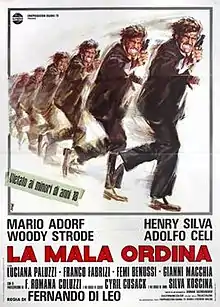The Italian Connection
The Italian Connection (Italian: La mala ordina, lit. "The mob orders"), also known as Manhunt in the City or Manhunt in Milan or Manhunt, is a 1972 polizieschi film directed by Fernando Di Leo.
| The Italian Connection | |
|---|---|
 | |
| Directed by | Fernando di Leo |
| Produced by | Armando Novelli[1] |
| Screenplay by |
|
| Story by | Fernando di Leo[1] |
| Based on | "Milan by Calibro 9" by Giorgio Scerbanenco (uncredited)[2] |
| Starring | |
| Music by | Armando Trovajoli[1] |
| Cinematography | Franco Villa[1] |
| Edited by | Amedeo Giomini[1] |
Production company |
|
| Distributed by | Alpherat |
Release date |
|
Running time | 100 minutes[3] |
| Country |
|
| Box office | ₤852.404 million |
Plot
Small-time Milanese pimp Luca Canali (Mario Adorf) is hunted by both local mobsters and New York mafia killers (Henry Silva and Woody Strode) after a heroin shipment fails to arrive. It becomes apparent he is not as soft as he appears and a deadly cat-and-mouse game is played out. Although he has nothing to do with the missing shipment, mafioso hunt him down, killing his wife and little girl, and he starts to fight back. In the penultimate scene, he faces the Mafia Don who killed his family and asks him why. After trying to offer him various deals, the Don demands that Luca look him in the eyes and shoot him in the heart. He does. Luca then confronts and eliminates the American hitmen in a protracted showdown in a wrecking yard, but is gruesomely injured in the process. The end leaves open if he survives, or not.
The American hitmen have contrasting personalities: Dave (Silva) is a playboy and loudmouth while Frank (Strode) is quiet and professional. The concept of a team comprising a black and white hitman, may have inspired the characters played by John Travolta and Samuel L. Jackson in Pulp Fiction.[4]
Cast
- Mario Adorf - Luca Canali
- Henry Silva - Dave Catania
- Woody Strode - Frank Webster
- Adolfo Celi - Don Vito Tressoldi
- Luciana Paluzzi - Eva Lalli
- Franco Fabrizi - Enrico Moroni
- Femi Benussi - Nana
- Gianni Macchia - Nicolo
- Peter Berling - Damiano
- Francesca Romana Coluzzi - Trini
- Cyril Cusack - Corso
- Sylva Koscina - Lucia Canali
- Jessica Dublin - Miss Kenneth
- Omero Capanna - Vito's Goon
- Giuseppe Castellano - Garagaz
- Lara Wendel - Rita
Production
Di Leo's original title for The Italian Connection was Ordini da un altro mondo (Orders form Another World).[2] The film's premise is taken from the short story "Milan by Calibro 9" by Giorgio Scerbanenco, which had appeared in the book Milano calibro 9, the inspiration for di Leo's earlier film of the same name; unlike the previous film, Scerbanenco did not receive an onscreen credit.[2] It was filmed at Dear Studios in Rome and on location in Milan.[1] Adolfo Celi and Luciana Paluzzi had already featured in a film together, the British production Thunderball (1965).
Release
The Italian Connection was released theatrically in Italy on 2 September 1972 where it was distributed by Alpherat.[1] The film grossed 852.404 million Italian lira on its theatrical run in Italy.[1] It was released in West Germany on 1 December 1972 under the title Der Mafiaboss - Sie töten wie Schakale.[1] The film received a release in the United States as The Italian Connection in 1973 with an 87-minute running time.[1] The film has since been released under the titles Hired to Kill, Black Kingpin, Hitmen, and Hit Men on American home video releases.[1]
The film was released by Raro on DVD and Blu-ray in the United States.[1]
References
Footnotes
- Curti 2013, p. 61.
- Curti 2013, p. 62.
- Curti 2013, p. 141.
- Italian B-Movies: Tarantino's inspiration
Sources
- Curti, Roberto (2013). Italian Crime Filmography, 1968-1980. McFarland. ISBN 0786469765.CS1 maint: ref=harv (link)